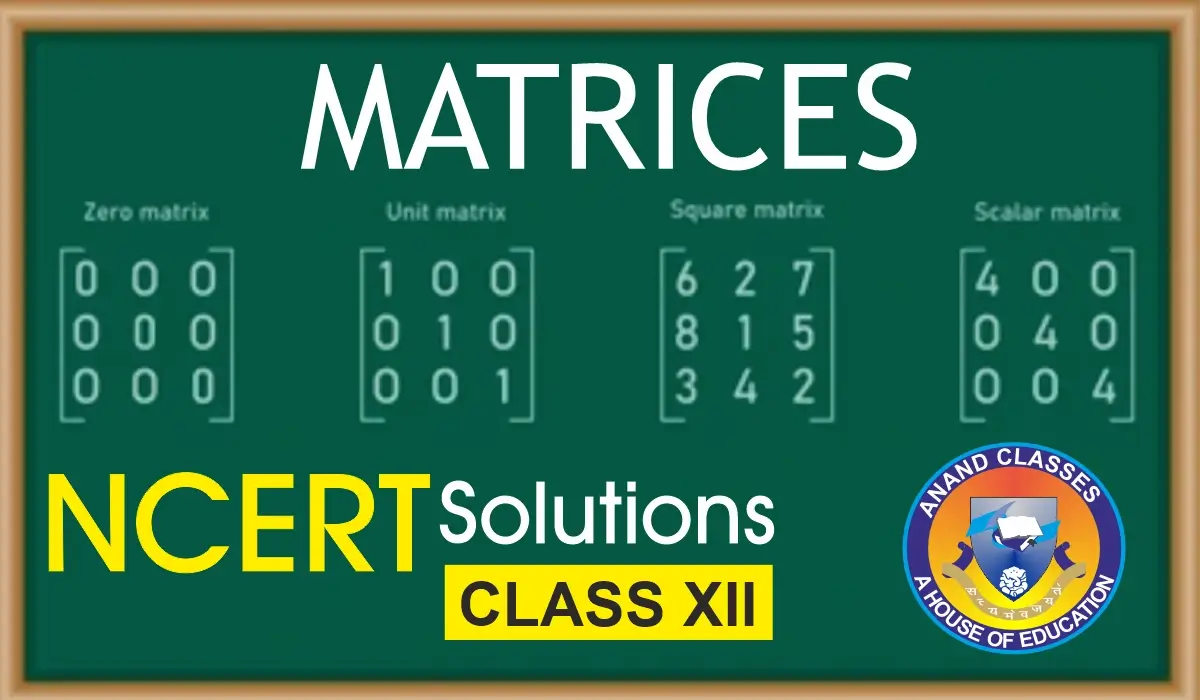Anand Classes provides complete NCERT Solutions for the Miscellaneous Exercise of Chapter 7 Integrals for Class 12 Mathematics, helping students strengthen their problem-solving ability with accurate, step-by-step explanations. These Set-1 notes cover all important concepts, formulas, and solved questions from the integration chapter, making them ideal for revision, board exam preparation, and self-study. Click the print button to download study material and notes.
NCERT Question.1 : Evaluate the integral
$$
\int \frac{1}{x-x^{3}}\;dx
$$
Solution
$$
\frac{1}{x-x^{3}}=\frac{1}{x(1-x^{2})}=\frac{1}{x(1-x)(1+x)}
$$
Partial fraction decomposition. Assume
$$
\frac{1}{x(1-x)(1+x)}=\frac{A}{x}+\frac{B}{1-x}+\frac{C}{1+x}\tag{i}
$$
Multiplying (i) by $x(1-x)(1+x)$ gives
$$
1=A(1-x^{2})+Bx(1+x)+Cx(1-x).
$$
Expanding,
$$
1=A-Ax^{2}+Bx+Bx^{2}+Cx-Cx^{2}.
$$
Comparing coefficients yields
$$
\begin{cases}
-A+B-C=0 \\
B+C=0\\
A=1 \\
\end{cases}
$$
Solving gives
$$
A=1\;\quad B=\tfrac{1}{2}\;\quad C=-\tfrac{1}{2}.
$$
Thus from (i)
$$
\frac{1}{x(1-x)(1+x)}=\frac{1}{x}+\frac{1}{2}\cdot\frac{1}{1-x}-\frac{1}{2}\cdot\frac{1}{1+x}.
$$
Integrate termwise.
$$
\int \frac{1}{x-x^{3}}\;dx
=\int\frac{1}{x}\;dx+\frac{1}{2}\int\frac{1}{1-x}\;dx-\frac{1}{2}\int\frac{1}{1+x}\;dx\ $$
$$ \int \frac{1}{x-x^{3}}\;dx=\log|x|-\tfrac{1}{2}\log|1-x|-\tfrac{1}{2}\log|1+x|+C $$
$$ \int \frac{1}{x-x^{3}}\;dx=\dfrac{1}{2}\log\left|\frac{x^{2}}{1-x^{2}}\right|+C$$
Final Result
$$\boxed{\int \frac{1}{x-x^{3}}\;dx=\dfrac{1}{2}\log\left|\frac{x^{2}}{1-x^{2}}\right|+C}$$
Download concise exam-ready notes by Anand Classes — perfect for JEE and CBSE students seeking top-quality study material and clear worked solutions.
NCERT Question.2 : Evaluate the integral
$$
\int \frac{1}{\sqrt{x+a}+\sqrt{x+b}}\;dx
$$
Solution
$$
\int \frac{1}{\sqrt{x+a}+\sqrt{x+b}}\;dx
$$
Rationalize the integrand by multiplying numerator and denominator by
$\sqrt{x+a}-\sqrt{x+b}$:
$$
\frac{1}{\sqrt{x+a}+\sqrt{x+b}}
=\frac{\sqrt{x+a}-\sqrt{x+b}}{(\sqrt{x+a}+\sqrt{x+b})(\sqrt{x+a}-\sqrt{x+b})}$$
$$\frac{1}{\sqrt{x+a}+\sqrt{x+b}}=\frac{\sqrt{x+a}-\sqrt{x+b}}{(x+a)-(x+b)}
$$
Hence
$$
\frac{1}{\sqrt{x+a}+\sqrt{x+b}}
=\frac{\sqrt{x+a}-\sqrt{x+b}}{a-b}.
$$
Therefore the integral becomes
$$
\int \frac{1}{\sqrt{x+a}+\sqrt{x+b}}\;dx
=\frac{1}{a-b}\int\bigl(\sqrt{x+a}-\sqrt{x+b}\bigr)\;dx.
$$
Integrate termwise:
$$
\int\sqrt{x+a}\;dx=\int (x+a)^{\tfrac{1}{2}}\;dx
=\frac{2}{3}(x+a)^{\tfrac{3}{2}}+C_1,
$$
$$
\int\sqrt{x+b}\;dx=\int (x+b)^{\tfrac{1}{2}}\;dx
=\frac{2}{3}(x+b)^{\tfrac{3}{2}}+C_2.
$$
So
$$
\int \frac{1}{\sqrt{x+a}+\sqrt{x+b}}\;dx
=\frac{1}{a-b}\left[\frac{2}{3}(x+a)^{\tfrac{3}{2}}-\frac{2}{3}(x+b)^{\tfrac{3}{2}}\right]+C.
$$
Final Result
$$
\boxed{\displaystyle \frac{2}{3(a-b)}\Bigl((x+a)^{\tfrac{3}{2}}-(x+b)^{\tfrac{3}{2}}\Bigr)+C}
$$
Download concise, exam-ready notes by Anand Classes — perfect for JEE and CBSE students seeking top-quality study material and clear worked solutions.
NCERT Question.3 : Evaluate the integral
$$ \int \frac{1}{x\sqrt{ax-x^{2}}}\;dx $$
Solution
$$ \int \frac{1}{x\sqrt{ax-x^{2}}}\;dx $$
Put
$$
x=a\sin^{2}\theta
\qquad\Rightarrow\qquad
dx=2a\sin\theta\cos\theta\;d\theta.
$$
Then
$$
ax-x^{2}=a\cdot a\sin^{2}\theta-a^{2}\sin^{4}\theta
=a^{2}\sin^{2}\theta\cos^{2}\theta,
$$
so
$$
\sqrt{ax-x^{2}}=a\sin\theta\cos\theta.
$$
Substitute into the integral:
$$\int \frac{1}{x\sqrt{ax-x^{2}}}\;dx=\int \frac{1}{a\sin^{2}\theta\;a\sin\theta\cos\theta}\cdot 2a\sin\theta\cos\theta\;d\theta$$
$$\int \frac{1}{x\sqrt{ax-x^{2}}}\;dx=\frac{2}{a}\int \csc^{2}\theta\;d\theta$$
Integrate:
$$
\frac{2}{a}\int \csc^{2}\theta\;d\theta=\frac{2}{a}\bigl(-\cot\theta\bigr)+C=-\frac{2}{a}\cot\theta+C.
$$
Return to $x$: from $x=a\sin^{2}\theta$ we have $\sin\theta=\sqrt{\dfrac{x}{a}}$ and $\cos\theta=\sqrt{\dfrac{a-x}{a}}$, Hence
$$
\cot\theta=\frac{\cos\theta}{\sin\theta}=\sqrt{\frac{a-x}{x}}.
$$
Therefore,
$$\int \frac{1}{x\sqrt{ax-x^{2}}}\;dx=-\frac{2}{a}\cot\theta=-\frac{2}{a}\sqrt{\frac{a-x}{x}}$$
Final Result
$$
\boxed{\displaystyle -\frac{2}{a}\sqrt{\frac{a-x}{x}}+C}
$$
Download concise, exam-ready notes by Anand Classes — perfect for JEE and CBSE students seeking top-quality study material and clear worked solutions.
NCERT Question.4 : Evaluate the integral
$$ \int \frac{1}{x^{2}(x^{4}+1)^{3/4}}\;dx $$
Solution
$$ \int \frac{1}{x^{2}(x^{4}+1)^{3/4}}\;dx $$
Put
$$
u=1+\frac{1}{x^{4}}=\frac{x^{4}+1}{x^{4}}.
$$
Then
$$
du=-4x^{-5}\;dx\qquad\Rightarrow\qquad x^{-5}\;dx=-\frac{1}{4}du.
$$
Express the integrand in terms of $u$. Note
$$
(x^{4}+1)^{3/4}=x^{3}u^{3/4}
$$
so
$$
\frac{1}{x^{2}(x^{4}+1)^{3/4}}=\frac{1}{x^{5}u^{3/4}}.
$$
Therefore
$$
\int \frac{1}{x^{2}(x^{4}+1)^{3/4}}\;dx =\int \frac{1}{x^{5}u^{3/4}}\;dx $$
$$ \int \frac{1}{x^{2}(x^{4}+1)^{3/4}}\;dx=\int u^{-3/4}\left(x^{-5}\;dx\right)=\int u^{-3/4}\left(-\frac{1}{4}du\right)$$
Integrate:
$$
-\frac{1}{4}\int u^{-3/4}\;du
=-\frac{1}{4}\cdot\frac{u^{1/4}}{1/4}+C
=-u^{1/4}+C.
$$
Substitute back $u=1+\dfrac{1}{x^{4}}$. We may also simplify:
$$
-u^{1/4}=\left(1+\frac{1}{x^{4}}\right)^{1/4}
=-\frac{(x^{4}+1)^{1/4}}{x}.
$$
$$ \int \frac{1}{x^{2}(x^{4}+1)^{3/4}}\;dx =-\frac{(x^{4}+1)^{1/4}}{x}.$$
Final Result
$$
\boxed{\displaystyle -\left(1+\frac{1}{x^{4}}\right)^{1/4}+C}
$$
which is equivalently $\displaystyle -\frac{(x^{4}+1)^{1/4}}{x}+C$
Download concise, exam-ready notes by Anand Classes — perfect for JEE and CBSE students seeking top-quality study material and clear worked solutions.
NCERT Question.5 : Evaluate the integral
$$\int \frac{1}{x^{1/2}+x^{1/3}}\;dx $$
Solution
$$\int \frac{1}{x^{1/2}+x^{1/3}}\;dx $$
Rewrite the integrand by taking out the lower power $x^{1/3}$:
$$
\frac{1}{x^{1/2}+x^{1/3}}
= \frac{1}{x^{1/3}\left(x^{1/6}+1\right)}
= x^{-1/3}\left(x^{1/6}+1\right)^{-1}.
$$
Now express powers together:
$$
x^{-1/3}=x^{-2/6}
$$
so
$$
\frac{1}{x^{1/2}+x^{1/3}}
= x^{-2/6}(x^{1/6}+1)^{-1}.
$$
Let
$$
t=x^{1/6}
$$
so
$$
dt=\frac{1}{6}x^{-5/6}\;dx
\quad\Rightarrow\quad
dx=6x^{5/6}\;dt.
$$
Convert all powers of $x$ into $t$:
- $x^{-2/6}=x^{-1/3}=t^{-2}$
- $x^{5/6}=t^{5}$
Thus
$$
\int \frac{1}{x^{1/2}+x^{1/3}}\;dx
= \int t^{-2}(t+1)^{-1}\;6t^{5}\;dt
= 6\int \frac{t^{3}}{t+1}\;dt.
$$
Divide:
$$
\frac{t^{3}}{t+1}=t^{2}-t+1-\frac{1}{t+1}.
$$
So the integral becomes
$$
6\int \left(t^{2}-t+1-\frac{1}{t+1}\right)\;dt.
$$
Integrate termwise:
$$
\begin{aligned}
6\Biggl[\frac{t^{3}}{3}-\frac{t^{2}}{2}+t-\ln|t+1|\Biggr]+C.
\end{aligned}
$$
Substitute $t=x^{1/6}$:
$$
\int \frac{1}{x^{1/2}+x^{1/3}}\;dx=2x^{1/2}-3x^{1/3}+6x^{1/6}-6\ln\left(1+x^{1/6}\right)+C.
$$
Final Result
$$
\boxed{(\displaystyle 2x^{1/2}-3x^{1/3}+6x^{1/6}-6\ln(1+x^{1/6})+C)}
$$
Access high-quality, exam-focused notes by Anand Classes for stronger fundamentals in calculus — ideal for CBSE and JEE aspirants seeking clear, stepwise solutions.
NCERT Question.6 : Evaluate the integral
$$\int \frac{5x}{(x+1)(x^{2}+9)}\;dx$$
Solution
$$\int \frac{5x}{(x+1)(x^{2}+9)}\;dx$$
Use partial fractions. Assume
$$
\frac{5x}{(x+1)(x^{2}+9)}=\frac{A}{x+1}+\frac{Bx+C}{x^{2}+9}.
$$
Multiply both sides by $(x+1)(x^{2}+9)$ and compare coefficients:
$$
5x=A(x^{2}+9)+(Bx+C)(x+1).
$$
Expanding,
$$
5x=(A+B)x^{2}+(B+C)x+(9A+C).
$$
Equating coefficients gives the system
$$
\begin{cases}
A+B=0, \\
B+C=5, \\
9A+C=0.
\end{cases}
$$
Solve: from $A=-B$ and $C=9B$, so $B+9B=10B=5\Rightarrow B=\tfrac{1}{2}$. Hence
$$
A=-\tfrac{1}{2},\qquad B=\tfrac{1}{2},\qquad C=\tfrac{9}{2}.
$$
Thus
$$
\frac{5x}{(x+1)(x^{2}+9)}
=-\frac{1}{2}\cdot\frac{1}{x+1}+\frac{1}{2}\cdot\frac{x}{x^{2}+9}+\frac{9}{2}\cdot\frac{1}{x^{2}+9}.
$$
Integrate termwise:
$$
\int \frac{5x}{(x+1)(x^{2}+9)}\;dx
=-\frac{1}{2}\int\frac{dx}{x+1}\;+\frac{1}{2}\int\frac{x \;dx} {x^{2}+9}\;dx+\frac{9}{2}\int\frac{dx}{x^{2}+9}$$
$$\int \frac{5x}{(x+1)(x^{2}+9)}\;dx=-\frac{1}{2}\ln|x+1|+\frac{1}{4}\ln\bigl(x^{2}+9\bigr)+\frac{3}{2}\tan^{-1}\bigl(\frac{x}{3}\bigr)+C.$$
Final Result
$$
\boxed{(\displaystyle -\frac{1}{2}\ln|x+1|+\frac{1}{4}\ln\bigl(x^{2}+9\bigr)+\frac{3}{2}\tan^{-1}\bigl(\frac{x}{3}\bigr)+C)}
$$
Download concise, exam-ready notes by Anand Classes — perfect for JEE and CBSE students seeking top-quality worked solutions and clear step-by-step explanations.
NCERT Question.7 : Evaluate the integral
$$
\int \frac{\sin x}{\sin(x-a)}\;dx
$$
Solution
$$\int \frac{\sin x}{\sin(x-a)}\;dx$$
Use the angle-addition identity :
$$\sin x=\sin\bigl((x-a)+a\bigr)=\sin(x-a)\cos a+\cos(x-a)\sin a$$
Hence,
$$
\frac{\sin x}{\sin(x-a)}=\frac{\sin(x-a)\cos a+\cos(x-a)\sin a}{\sin(x-a)}=\cos a+\sin a\cot(x-a)
$$
So the integral becomes
$$
\int \frac{\sin x}{\sin(x-a)}dx
=\int\bigl(\cos a+\sin a\cot(x-a)\bigr)dx
$$
Integrate termwise.
The first term gives $x\cos a$.
$$\int\cos a\;dx = x\cos a $$
For the second term use $\int \cot u\;du=\log|\sin u|$ with $u=x-a$:
$$ \int \sin a\cot(x-a)dx =\sin a\int \cot(x-a)dx =\sin a\log\bigl|\sin(x-a)\bigr|+C$$
Combined the above two terms, we get :
$$
\int \frac{\sin x}{\sin(x-a)}dx
=\displaystyle x\cos a+\sin a\log\bigl|\sin(x-a)\bigr|+C
$$
Therefore
$$
\int \frac{\sin x}{\sin(x-a)}\;dx = \displaystyle x\cos a+\sin a\log\bigl|\sin(x-a)\bigr|+C
$$
Final Result
$$
\boxed{(\displaystyle x\cos a+\sin a\log\bigl|\sin(x-a)\bigr|+C)}
$$
Download concise, exam-ready notes by Anand Classes — perfect for JEE and CBSE students seeking top-quality worked solutions and clear step-by-step explanations.
NCERT Question.8 : Evaluate the integral
$$
\int \frac{e^{5\log x}-e^{4\log x}}{e^{3\log x}-e^{2\log x}}\;dx
$$
Solution
$$
\int \frac{e^{5\log x}-e^{4\log x}}{e^{3\log x}-e^{2\log x}}\;dx
$$
Use the identity
$$e^{k\log x}=x^{k}.$$
So,
$$
e^{5\log x}-e^{4\log x}=x^{5}-x^{4}=x^{4}(x-1)
$$
$$
e^{3\log x}-e^{2\log x}=x^{3}-x^{2}=x^{2}(x-1)
$$
Therefore,
$$
\frac{e^{5\log x}-e^{4\log x}}{e^{3\log x}-e^{2\log x}}=\frac{x^{4}(x-1)}{x^{2}(x-1)}=x^{2}.
$$
Hence,
$$
\int \frac{e^{5\log x}-e^{4\log x}}{e^{3\log x}-e^{2\log x}}\;dx\int x^{2}\;dx\frac{x^{3}}{3}+C.
$$
Final Result
$$
\boxed{\displaystyle \frac{x^{3}}{3}+C}
$$
Get high-quality math solutions and detailed step-by-step notes from Anand Classes — ideal for JEE, NEET, and CBSE preparation with clear explanations and exam-oriented practice.
NCERT Question.9 : Evaluate the integral
$$\int \frac{\cos x}{\sqrt{4-\sin^{2}x}}\;dx$$
Solution
$$\int \frac{\cos x}{\sqrt{4-\sin^{2}x}}\;dx$$
Let
$$\sin x=t \quad\Rightarrow\quad \cos x\;dx=dt$$
Then the integral becomes
$$
\int \frac{dt}{\sqrt{4-t^{2}}}.
$$
Use the standard formula
$$\int \frac{1}{\sqrt{a^{2}-t^{2}}}\;dt=\sin^{-1}\left(\frac{t}{a}\right)+C$$
Here, $(a=2)$. So,
$$
\int \frac{dt}{\sqrt{4-t^{2}}}= \sin^{-1}\left(\frac{t}{2}\right)+C.
$$
Back-substitute $(t=\sin x)$:
$$
\int \frac{\cos x}{\sqrt{4-\sin^{2}x}}\;dx=\sin^{-1}\left(\frac{\sin x}{2}\right)+C.
$$
Final Result
$$
\boxed{\displaystyle \sin^{-1}\left(\frac{\sin x}{2}\right)+C}
$$
Enhance your preparation with clear, step-by-step solutions from Anand Classes — perfect for strengthening calculus concepts for CBSE, JEE, and other competitive exams.
NCERT Question.10 : Evaluate the integral
$$\int \frac{\sin^{8}x-\cos^{8}x}{1-2\sin^{2}x\cos^{2}x}\;dx$$
Solution
Note that with $\sin^{2}x + \cos^{2}x = 1 $. The numerator factors as
$$
\sin^{8}x-\cos^{8}x=(\sin^{4}x-\cos^{4}x)(\sin^{4}x+\cos^{4}x)$$
$$\sin^{8}x-\cos^{8}x=(\sin^{2}x-\cos^{2}x) (\sin^{2}x+\cos^{2}x) (\sin^{4}x+\cos^{4}x) $$
$$\sin^{8}x-\cos^{8}x=(\sin^{2}x-\cos^{2}x)(\sin^{4}x+\cos^{4}x)$$
But
$$
\sin^{4}x+\cos^{4}x=(\sin^{2}x+\cos^{2}x)^{2}-2\sin^{2}x\cos^{2}x
=1-2\sin^{2}x\cos^{2}x.
$$
Therefore the integrand simplifies to
$$
\frac{\sin^{8}x-\cos^{8}x}{1-2\sin^{2}x\cos^{2}x}
=\frac{(\sin^{2}x-\cos^{2}x)\bigl(1-2\sin^{2}x\cos^{2}x\bigr)}{1-2\sin^{2}x\cos^{2}x} $$
$$\frac{\sin^{8}x-\cos^{8}x}{1-2\sin^{2}x\cos^{2}x}=\sin^{2}x-\cos^{2}x=-\cos 2x $$
So the integral reduces to
$$
\int \frac{\sin^{8}x-\cos^{8}x}{1-2\sin^{2}x\cos^{2}x}=\int -\cos 2x\;dx.
$$
Integrate:
$$
\int -\cos 2x\;dx=-\frac{1}{2}\sin 2x + C.
$$
Final Result
$$
\; \boxed{\displaystyle -\frac{1}{2}\sin 2x + C\;}
$$
Download clear, exam-focused notes by Anand Classes — perfect for JEE and CBSE aspirants who want concise solutions and step-by-step explanations.


